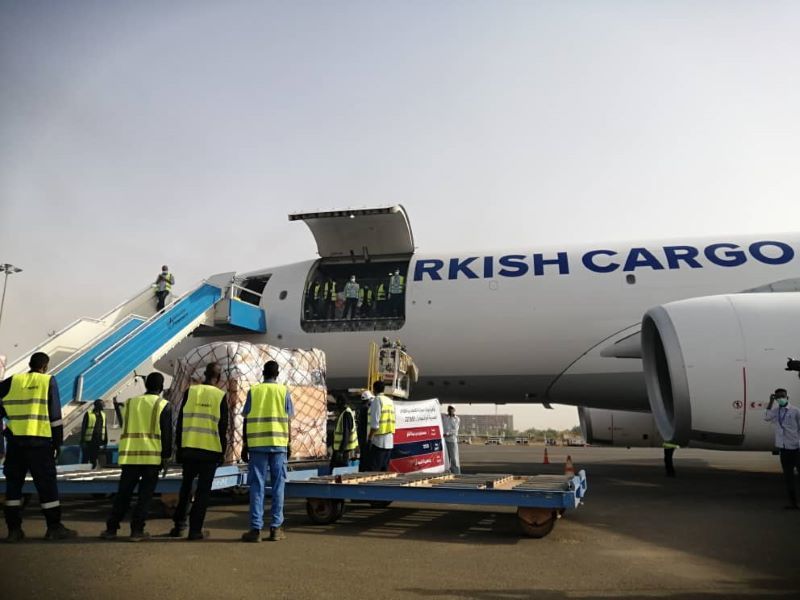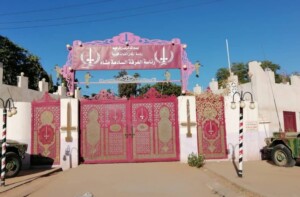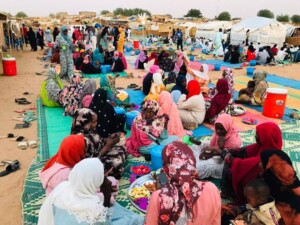Humanitarian needs grow in Omdurman, more aid arrives in Port Sudan

A Turkish cargo aircraft lands at the Port Sudan International Airport carrying humanitarian relief items (SUNA)
OMDURMAN / SENNAR / PORT SUDAN –
Omdurman’s El Mansoura neighbourhood witnessed clashes between the Sudanese army and the Rapid Support Forces (RSF) yesterday, exacerbating the dire humanitarian crisis in the area. The people who did not flee the Sudanese capital belong to the poorer segments of society and remain stuck inside the city. Shipments with relief items from Qatar, and Bahrain arrived at Port Sudan International Airport yesterday. An USAID shipment with grain to feed 2 million people for one month was offloaded in a Red Sea state harbour.
Intense clashes between the Sudan Armed Forces (SAF) and the RSF that erupted yesterday in the densely populated El Mansoura neighbourhood of Ombadda, Omdurman, have left three people dead and six injured, according to Abdelrahim, Spokesperson for the Ombadda Resistance Committees. The battles followed the crash of a military aircraft on Wednesday.
Abdelrahim added that “life here is becoming harder each day, because the scarcity of essential goods in homes and shops and the absence of nearby markets”.
Urgent medical assistance and food supplies are needed throughout Ombadda, particularly in El Mansoura and Hamad El Nil, he told Radio Dabanga. “Most residents of El Mansoura normally rely on day-to-day work for their livelihoods. Their food reserves depleted days ago.”
He said that members of the resistance committees in the area have set up an emergency room that provides life-saving medications, treatment for chronic diseases, and primary care services. “This is far from enough, however, we really need more healthcare clinics”.
The El Mansoura Emergency Room, staffed by two doctors, has treated 14 injuries resulting from bombing and shrapnel extraction. However, the room is facing shortages of medications and medical consumables, including gauze and Amidol.
Decreasing numbers
The Sennar Beitak (Sennar is your home) youth initiative, which is assisting people who fled from Khartoum since the SAF-RSF war broke out on April 15, witnessed a significant decrease in the flow of arrivals in recent days.
Ahmed El Sadig, a member of the initiative, noted a decrease from 45-54 people per day to only 10-15 people per week.
He attributed the decrease to the fact that “the people who fled Khartoum in the beginning were those with money, while the poorest people stayed in Khartoum as they could not afford the pricy transport tariffs”.
More aid arrives
On Wednesday evening, two humanitarian aid shipments from Qatar and Bahrain arrived at Port Sudan International Airport, the Sudan News Agency (SUNA) reported yesterday. Social Development Minister Ahmed Bakheet, along with the ambassadors of Qatar and Bahrain in Sudan, were present at the airport.
The Qatari aid shipment consisted of 39 tonnes of food supplies, while Bahrain sent 20 tonnes of medical resources. Bakheet expressed gratitude on behalf of the Sudanese people for the shipments.
Yesterday, an USAID shipment with grain to feed 2 million people for one month was offloaded in a Red Sea state harbour, Samantha Power, administrator of the US agency, said in a tweet in the evening.
“USAID is proud to support getting this life-saving assistance to people facing extreme hunger due to the ongoing crisis,” she stated.
On May 17, Ramesh Rajasingham, Director of the Coordination Division of the UN Office for the Coordination of Humanitarian Affairs (OCHA) highlighted the urgent need for funding to help to assist 25 million people in Sudan who are in need of humanitarian aid and protection.
“The funding requirements of nearly $2.6 billion is also the highest for any humanitarian appeal for Sudan,” Rajasingham said.
OCHA reported yesterday that “20 trucks carrying supplies from UNICEF and the International Organization for Migration [IOM]” are on their way to different parts of the country.
Radio Dabanga reported last week that the UN World Food Programme (WFP) plans to provide aid to 4.9 million vulnerable people in Sudan.











 and then
and then